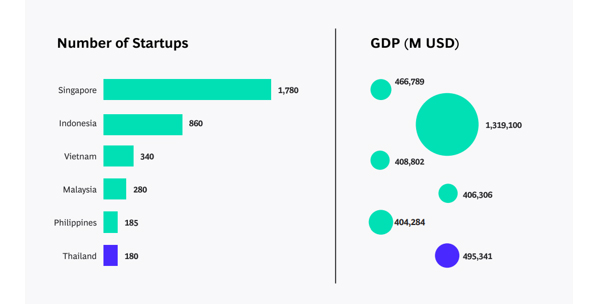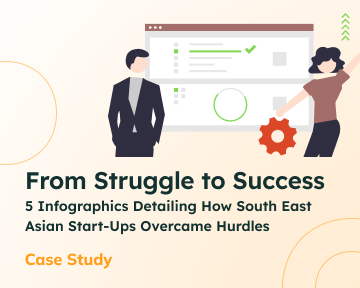In the current fast-evolving and digitally intense business landscape, the distinction between startups and traditional businesses are becoming increasingly blurred. Startups, with their innovative approaches and agile methodologies, are not just disruptors; they are also valuable sources of insights for more established businesses. In Southeast Asia, where the startup scene is booming, sharing ideas between startups and established companies has been especially helpful. By examining how startups operate, other businesses can adopt practices that drive innovation, efficiency, and fuels growth.
The Startup Ecosystem in South East Asia
South East Asia has emerged as a vibrant hub for startups, thanks to a young and tech-savvy population, rising internet penetration, and supportive government policies. Countries like Singapore, Indonesia, and Malaysia are leading the charge, fostering environments where startups can thrive. These startups, operating across diverse sectors such as fintech, e-commerce, and health tech, bring fresh perspectives and novel solutions to market challenges.


Image: Tech startups in South East Asia, by December 2023. Source: Business Information Industry Association, 2024
The Startup Ecosystem in South East Asia
- Be Agile and Flexible
Startups are renowned for their agility, strong ability to navigate uncertainties of the market. Unlike larger, more established companies with rigid structures, startups can pivot quickly in response to new information or changing circumstances.
For example, Grab, originally a ride-hailing service from Malaysia, expanded rapidly into food delivery and financial services. This adaptability allowed Grab to remain relevant and grow despite market fluctuations.
Lesson for Non-Startups: Embrace a more flexible approach to business strategy and look for new opportunities even if they seem far away from your current specialisation. Encourage departments to experiment with new ideas and iterate quickly based on feedback and market conditions.
Read more about the state of marketing in Malaysia.
2. Use a Customer-Centric Approach
Startups often build their businesses around solving specific customer pain points. This intense focus on the customer ensures that their products and services are not only relevant but also highly valued by their target audience. Following this principle, Tokopedia, an Indonesian e-commerce giant, has continuously refined its platform based on user feedback, ensuring a seamless and user-friendly experience.
Lesson for Non-Startups: Foster a culture of listening to and prioritising customer feedback. Use this feedback to drive product and service improvements, ensuring they meet the evolving needs of your customers. In fact, even big companies such as Amazon still aim for its mission of being Earth’s most customer-centric company. This comes to show that no matter how large your business may scale, solving customers’ needs should always be the priority in all your innovations.
Find out how you can support your customer-centric approach in your communication.
3. Maximising Efficiency
Operating with limited resources forces startups to be efficient. They often employ lean startup methodologies, focusing on creating minimum viable products (MVPs) and validating business ideas with minimal investment. Singapore-based fintech startup Aspire leverages lean principles to provide cost-effective financial solutions for small businesses, providing functions that are built in collaboration with partners, maximising their service stack.
Lesson for Non-Startups: Adopt lean principles by streamlining operations, eliminating waste, and focusing on delivering value to customers efficiently. This can lead to significant cost savings and improved operational efficiency.
Learn more on the marketing environment in Singapore.
4. Adopting Innovations
Startups are typically early adopters of cutting-edge technologies, using them to disrupt traditional industries. For instance, Gojek, an Indonesian super-app, integrates various services such as transportation, payments, and logistics into a single platform using advanced technology. This not only enhances user convenience but also creates a powerful ecosystem of services.
Lesson for Non-Startups: Invest in modern technologies that can streamline operations, enhance customer experiences, and open new revenue streams. Staying ahead of technological trends can provide a competitive edge.
Find out more about how adopting digital solutions can increase operation efficiency for smaller businesses.
5. Strong Company Culture
Startups often cultivate strong, cohesive cultures that emphasise collaboration, innovation, and a shared vision. This cultural foundation can be a powerful driver of employee motivation and company success. For example, Carousell, a Singapore-based classifieds marketplace, fosters a culture of teamwork and transparency, which has been crucial to its rapid growth and success for many years.
Lesson for Non-Startups: Priortise building and maintaining a strong company culture that aligns with your business values and objectives. This can enhance employee engagement, productivity, and overall company performance.
Conclusion
The success stories from Southeast Asia’s startup ecosystem offer valuable lessons for mature businesses. By turning startup operational principles into lessons, established businesses can rejuvenate their operations and drive sustainable growth. In an era where change is the only constant, learning from startup experiences can become the key differentiator that sets successful businesses apart.
What's next?
Our team at “Lead Gen and CRM” serves established businesses and startups that want to digitise their sales and marketing operations. “Lead Gen and CRM” tool lets you take control of your interactions with potential and current customers increasing efficiency of marketing and sales departments. With “Lead Gen and CRM” you also can be sure that you will be able to maintain personalised marketing communication while scaling up with no loss in quality. Contact us now to learn how CRM and Marketing Automation can support you now and in the long term future.





